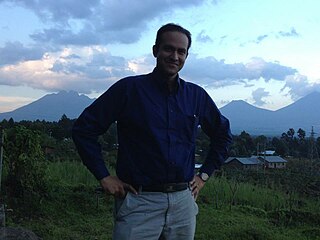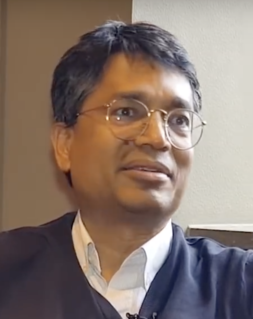
The United States Department of State (DOS), commonly referred to as the State Department, is a federal executive department responsible for carrying out U.S. foreign policy and international relations. Established in 1789 as the nation's first executive department, its duties include advising the President of the United States, administering the nation's diplomatic missions, negotiating treaties and agreements with foreign entities, and representing the U.S. at the United Nations.

The United Nations Environment Programme is responsible for coordinating the UN's environmental activities and assisting developing countries in implementing environmentally sound policies and practices.

A transboundary protected area (TBPA) is an ecological protected area that spans boundaries of more than one country or sub-national entity. Such areas are also known as transfrontier conservation areas (TFCAs) or peace parks.
Cultural diplomacy is a type of public diplomacy and soft power that includes the "exchange of ideas, information, art, language and other aspects of culture among nations and their peoples in order to foster mutual understanding". The purpose of cultural diplomacy is for the people of a foreign nation to develop an understanding of the nation's ideals and institutions in an effort to build broad support for economic and political goals. In essence "cultural diplomacy reveals the soul of a nation", which in turn creates influence. Though often overlooked, cultural diplomacy can and does play an important role in achieving national security efforts.
Biopolitics is an intersectional field between human biology and politics. It is a political wisdom taking into consideration the administration of life and a locality’s populations as its subject. To quote Foucault, it is ‘to ensure, sustain, and multiply life, to put this life in order."

Cultural heritage is the legacy of physical artifacts and intangible attributes of a group or society that is inherited from past generations. Not all legacies of past generations are "heritage", rather heritage is a product of selection by society.

Giles Scott-Smith is Senior Researcher at the Roosevelt Study Center in Middelburg and Ernst van der Beugel Chair in the Diplomatic History of Atlantic Cooperation since World War II at the University of Leiden.

Saleem H. Ali is a Pakistani American Australian academic who is the Blue and Gold Distinguished Professor of Energy and the Environment at the University of Delaware and also directs the university's Minerals, Materials and Society program. He has also held the Chair in Sustainable Resources Development at the University of Queensland in Brisbane Australia where he retains affiliation as a Professorial Research Fellow. He is also a Senior Fellow at Columbia University's Center on Sustainable Investment. Previously he was Professor of Environmental Studies at the University of Vermont's Rubenstein School of Natural Resources, and the founding director of the Institute for Environmental Diplomacy and Security as well as a Fellow at the Gund Institute. He is known for his work on environmental conflict resolution, particularly in the extractive industries and was profiled in Forbes magazine in September, 2009 as "The Alchemist." His book "Treasures of the Earth: Need Greed and a Sustainable Future" received a cover endorsement by Nobel laureate Muhammad Yunus for providing a " welcome linkage between environmental behavior and poverty alleviation." In May 2010, he was also chosen by National Geographic as an "emerging explorer" with a profile appearing in the June 2010 issue of National Geographic Magazine. In March 2011, he was also selected by the World Economic Forum as a "Young Global Leader."
Global commons is a term typically used to describe international, supranational, and global resource domains in which common-pool resources are found. Global commons include the earth's shared natural resources, such as the high oceans, the atmosphere and outer space and the Antarctic in particular. Cyberspace may also meet the definition of a global commons.

The Ministry of Foreign Affairs, European Union and Cooperation (MAEUEC) is a department of the Government of Spain in charge of planning, managing, carrying out and evaluating the country's foreign policy and the international cooperation for development policy, paying special attention to the ones in relation to the European Union and Ibero-America as well as coordinating and supervising all actions done in this areas by the other Ministries and Public Administrations. Likewise, it is responsible for promoting international economic, cultural and scientific relationships, taking part in suggesting and carrying out the migration policy, promoting cross-border and interterritorial cooperation, protecting Spaniards abroad and preparing, negotiating and processing the international treaties which Spain is part of.

Ministry of Foreign Affairs of Azerbaijan is a Cabinet-level governmental agency in Azerbaijan Republic in charge of conducting and designing Azerbaijani Foreign policy.
Water conflict is a term describing a conflict between countries, states, or groups over the rights to access water resources. The United Nations recognizes that water disputes result from opposing interests of water users, public or private. A wide range of water conflicts appear throughout history, though rarely are traditional wars waged over water alone. Instead, water has historically been a source of tension and a factor in conflicts that start for other reasons. However, water conflicts arise for several reasons, including territorial disputes, a fight for resources, and strategic advantage. A comprehensive online database of water-related conflicts—the Water Conflict Chronology—has been developed by the Pacific Institute. This database lists violence over water going back nearly 6,000 years.
Guerrilla diplomacy is both a method of diplomacy and an alternative approach to international relations designed for the globalization age.
Environmental peacebuilding examines and advocates environmental protection and cooperation as a factor in creating more peaceful relations. Peacebuilding is both the theory and practice of identifying the conditions that can lead to a sustainable peace between past, current or potential future adversaries. At the most basic level, warfare devastates ecosystems and the livelihoods of those who depend on natural resources, and the anarchy of conflict situations leads to the uncontrolled, destructive exploitation of natural resources. Preventing these impacts allows for an easier movement to a sustainable peace. From a more positive perspective, environmental cooperation can be one of the places where hostile parties can sustain a dialogue, and sustainable development is a prerequisite for a sustainable peace.

Diplomacy is the practice of conducting negotiations between representatives of states or groups. It entails influencing the decisions and conduct of foreign governments and officials through dialogue, negotiation, and other nonviolent means. It usually refers to international relations carried out through the intercession of professional diplomats with regard to a full range of topical issues.
The Fletcher School of Law and Diplomacy is the graduate school of international affairs of Tufts University, in Medford, Massachusetts. Fletcher is well-ranked in its masters and doctoral international affairs programs. As of 2017, the student body numbered around 230, of whom 36 percent were international students from 70 countries, and around a quarter were U.S. minorities. The school's alumni network numbers over 9,500 in 160 countries, and includes ambassadors, diplomats, high ranking military officers, heads of nonprofit organizations, and corporate executives.
Science diplomacy is the use of scientific collaborations among nations to address common problems and to build constructive international partnerships. Many experts and groups use a variety of definitions for science diplomacy. However, science diplomacy has become an umbrella term to describe a number of formal or informal technical, research-based, academic or engineering exchanges.
Agni Vlavianos Arvanitis was a professor and researcher in biology. Her main contribution lies in the field of biopolitics, and the theory of bios. She graduated from Barnard College in 1957 (B.A.), New York University (M.S.) and the University of Athens (Ph.D.). She worked as a researcher at the Museum of Natural History in New York, the University of California at Berkeley, and the University of Paris. She has also taught Biology, Biochemistry and Human Genetics at the Friends Seminary in New York, the American Community Schools Academy in Athens, and the University of Maryland.

Ashok Swain is an Indian-born academic and professor of peace and conflict research at the Department of Peace and Conflict Research, Uppsala University. In 2017, he was appointed as the UNESCO Chair of International Water Cooperation and became the first UNESCO Chair of Uppsala University. Swain received his PhD in 1991 from the School of International Studies of Jawaharlal Nehru University, New Delhi, India. Ashok Swain has been a MacArthur Visitng Fellow at the University of Chicago, visiting fellow at UN Research Institute for Social Development, Geneva; and visiting professor at University Witwatersrand, University of Science, Malaysia, University of British Columbia, University of Maryland, Stanford University, McGill University, Tufts University and University of Natural Sciences and Life Sciences, Vienna. He has written extensively on new security challenges, water sharing issues, environment, conflict and peace, and democratic development issues. He has published 17 books, more than 44 journal articles. Swain has worked as a policy consultant on the environment, water, development and migration issues for various UN agencies and Governments of Sweden, Netherlands, UK, and Singapore. He also writes and comments frequently on South Asian Politics and Religious Fundamentalism.
Lynn Meskell is an Australian-born archaeologist and anthropologist. She completed her Ph.D. at Cambridge University in 1997. She is currently Professor of Anthropology at Stanford University.









